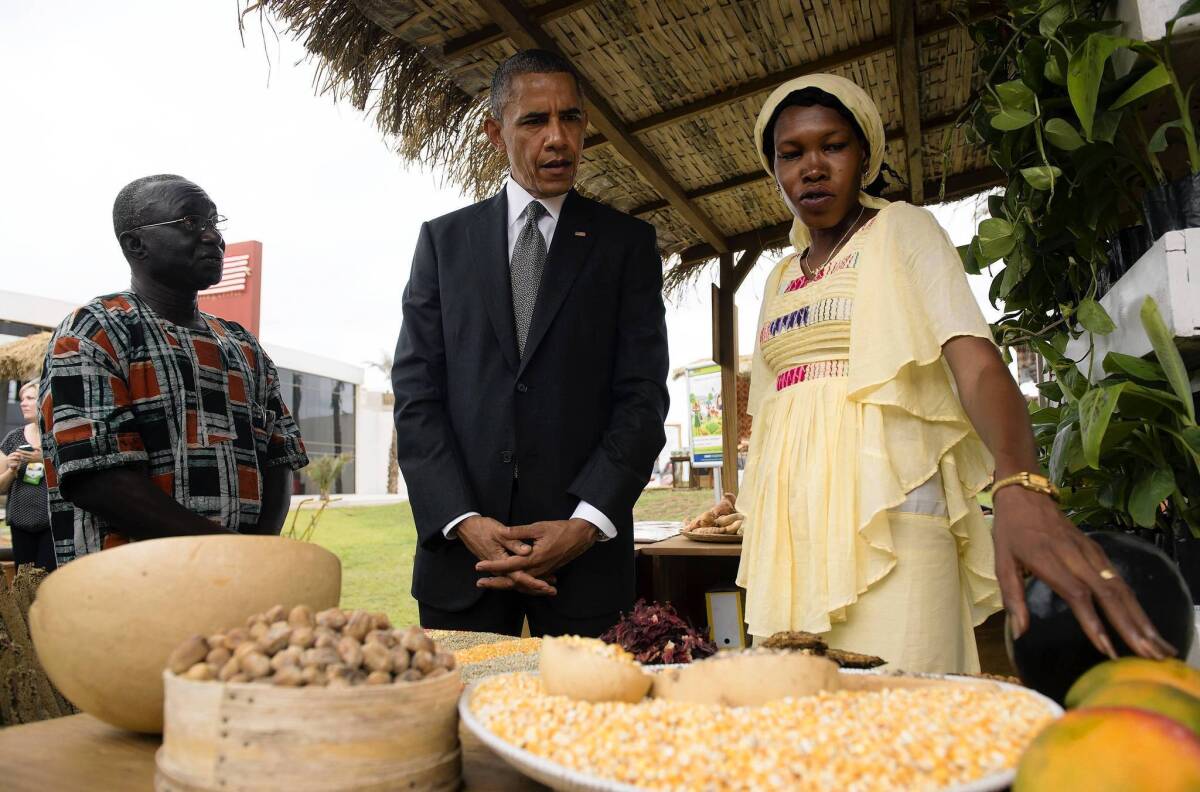Obama touts G-8 plan to reduce hunger in Africa

- Share via
DAKAR, Senegal — President Obama on Friday touted his vision to reduce hunger in Africa and the developing world by injecting new business and science initiatives into farming.
The president emphasized food security while touring Dakar, Senegal’s capital, saying far too many people on the continent endure poverty and chronic hunger. He also announced that Senegal had become the 10th country to join the New Alliance for Food Security and Nutrition, a Group of 8 plan that has seen $3.7 billion pledged in private investments in Africa.
“This is a moral imperative,” Obama said. “I believe that Africa is rising and wants to partner with us, not be dependent but be self-sufficient.”
But critics say the alliance, the centerpiece for reaching such goals, has been fraught with controversy since its launch last year at Camp David.
The plan by the eight economically powerful nations calls for lifting millions of people out of poverty and hunger by encouraging foreign companies, including massive agricultural multinationals, to invest in Africa in exchange for government incentives that critics say involve fewer protections for small farmers along with greater crackdowns on corruption.
Some analysts say the plan risks driving the poorest farmers from their small holdings and leaving populations worse off. It places too much emphasis on getting business to invest in agriculture and not enough, if any, on ensuring the efforts will lead to better production for small farmers, or better nutrition for hungry children, these analysts say.
Poor nutrition results in large numbers of children with stunted growth, poor brain development and low grades, which often lead to limited job prospects or unemployment and ultimately, low national production, according to research published this month in the Lancet medical journal.
The vast majority of private investments pledged under the alliance are not expected to produce high-protein, nutrition-rich foods; many will focus on non-food activities such as selling fertilizer, some analysts said.
Henk Hobbelink of the nonprofit organization Grain said small farmers who bought imported seeds, pesticides and fertilizers from foreign companies could be driven into debt and lose their farms. In recent years, huge agricultural firms have leased or bought millions of acres in Africa, often leading to the evictions of small farmers, he said.
Hobbelink said the assumption that huge corporations producing one crop were more efficient than small farmers producing several crops didn’t hold, particularly given the amount of water and gasoline used by large-scale farmers.
“We think we need to strengthen small farmers and listen to them about their problems in getting their food to market, rather than bringing in the Monsantos,” he said.
George Monbiot, a columnist for the Guardian newspaper, recently compared the alliance initiative to colonialism and slavery, because it involves cajoling “African countries into a new set of agreements that allow foreign companies to grab their land, patent their seeds and monopolize their food markets.”
A global revolution in addressing hunger has seen the United Nations, governments and nongovernmental organizations addressing hunger not necessarily through emergency food handouts in a crisis, but by improving access to better nutrition from birth, improving agriculture and targeting the poorest small farmers upon which most Africans depend for food. Poor nutrition kills millions of children in developing countries each year, experts say.
Lawrence Haddad, director of the Institute of Development Studies, said that unless the G-8 food alliance specifically targeted the poorest, small farmers cultivating less than 5 acres and women who do not have access to land, it was unlikely to improve nutrition and reduce hunger.
Haddad said the initiative should be independently evaluated, to ensure that it actually improved nutrition and food security, given that the objective of corporations would be selling seed, pesticides and fertilizers to small farmers. He said these could improve productivity, and nutrition, if the scheme was properly monitored.
“The question is, can they [farmers] afford to buy it? Do they have to borrow money, and will it leave them worse off in terms of that debt, if the improved productivity isn’t greater than the increase in debt?” Haddad said.
On the front lawn of the luxury hotel where Obama stayed, the U.S. Agency for International Development set up five booths with displays explaining various programs aimed at reducing hunger and malnutrition. The president, accompanied by USAID Administrator Rajiv Shah, stopped at the thatched-roof displays, looking at seedlings, sweet potatoes and a chart explaining how small farmers were using technology to compete with agribusinesses.
Obama chatted with Nimna Diayte, a farmer and the president of a cooperative of 3,000 farmers. The network uses cellphones to link members to ensure they get the best price for their crops. The young woman said the network had boosted her profits and she’d bought herself a tractor.
In remarks after visiting the booths, Obama touted the success of U.S. and international efforts to address hunger, including Feed the Future, launched in 2010, which focuses on small farms and women.
A progress report released Friday indicated that the initiative had helped more than 7 million farmers improve their equipment or practices, developed more than 660 public-private partnerships and increased the value of exported commodities by $84 million.
kathleen.hennessey@latimes.com
Dixon reported from Johannesburg, South Africa, and Hennessey from Dakar.
More to Read
Sign up for Essential California
The most important California stories and recommendations in your inbox every morning.
You may occasionally receive promotional content from the Los Angeles Times.











